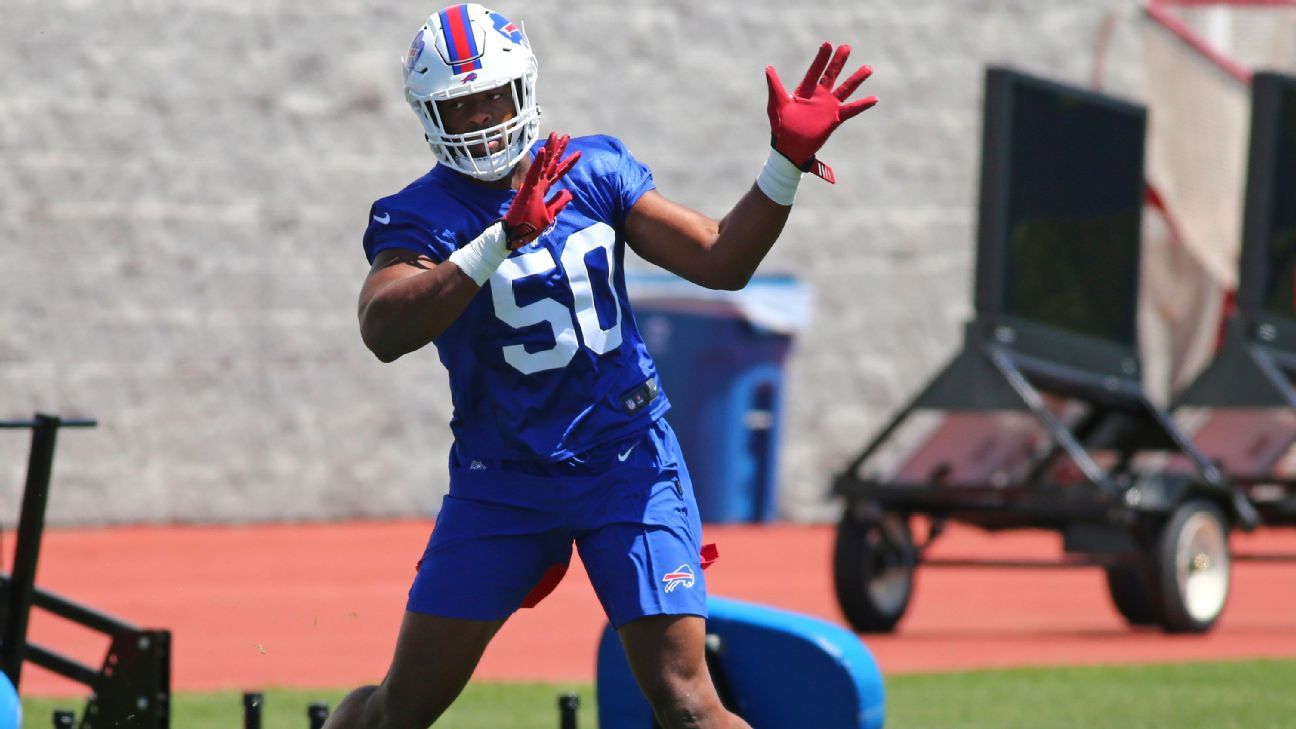
BUFFALO, N.Y. — During their four-year rebuild, the Buffalo Bills have drafted several prospects who they were counting on to produce right away.
Cornerback Tre’Davious White is probably the poster child for the team’s instant-impact rookies, alongside linebacker Tremaine Edmunds and defensive tackle Ed Oliver. Offensive linemen Cody Ford and Dawson Knox and running back Zack Moss also fit that mold to an extent, although they weren’t relied upon as heavily as White, Edmunds and Oliver. Quarterback Josh Allen took over the starting job in Week 2 in 2018, but GM Brandon Beane later admitted the Bills were forced to play Allen before he was ready, so he doesn’t really fit in this exercise.
Regardless, the Bills are now among AFC’s upper echelon with a veteran roster nearly entirely intact from a season ago, so they probably won’t need any rookies from their 2021 class to play a major role immediately. There simply isn’t as clear of a path to playing time.
“We didn’t go into this draft, to be clear, and say, ‘Hey, we just want to draft for future.’ We wanted as many impact players this year as we [could],” Beane said. “It’s just hard … It’s harder to crack the lineup. And it’s harder to make the roster, which is what I want.”
In the 2021 NFL draft, defensive ends Gregory Rousseau and Carlos Basham Jr. were selected in the first and second rounds, respectively, to bolster Buffalo’s pass rush — not necessarily to replace incumbent starters Jerry Hughes and Mario Addison.
At least, not right away.
After taking Rousseau at No. 30 overall, Beane said he and last year’s second-round pick AJ Epenesa would hopefully be Buffalo’s starting defensive ends of the future (although this was before selecting Basham at No. 61). With Hughes and Addison set to become unrestricted free agents after the 2021 season, the young trio can spend one more year alongside the two veterans before taking over for them full-time in 2022.
“I think we’ve got guys who are going to be part of the equation in 2021,” Beane said. “Greg Rousseau, Carlos Basham — we’ve talked about it before, we rotate our D-linemen. I’m not going to promise either one of them a starting job, but they’re going to have an opportunity to start.”
Beane also made it clear that offensive tackles Spencer Brown (third round) and Tommy Doyle (fifth round) were depth options should starters Dion Dawkins and Daryl Williams miss any time. Depending on how quickly he acclimates to the NFL after a year away from football and four years at FCS Northern Iowa, Brown could operate as the Bills’ swing tackle during his rookie season, possibly taking over for Williams in 2022 if the team needs to shed salary.
1:00
Check out the best highlights from Miami (OH) OG Tommy Doyle’s college career.
Doyle is an interesting case because it appears Buffalo sees him as a Ford-type, with the versatility to play tackle and guard despite his massive 6-foot-8, 320-pound size.
The player with arguably the best chance at playing a major role right away is receiver Marquez Stevenson, Buffalo’s sixth-round pick out of Houston. The speedy deep threat has his work cut out for him if he wants to crack a rotation that already features Stefon Diggs, Gabriel Davis, Cole Beasley and Emmanuel Sanders, but he has an excellent shot at taking over for Andre Roberts as the Bills’ return specialist.
Stevenson averaged 26.8 yards per return during his college career, returning three for a touchdown.
“That’s probably the thing that was most attractive to us,” Beane said of Stevenson’s ability as a returner. “He’s still a young player as a receiver. He didn’t run a variety of routes (at Houston), but get the ball in his hands and he’s explosive.”
There isn’t a player in the Bills’ 2021 class who will need to fill a major role in the way White or Edmunds had to — but don’t be surprised to see several of them make an impact early in their NFL careers.
